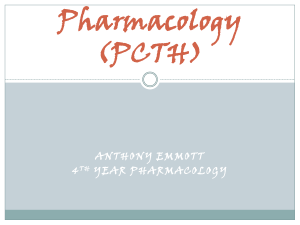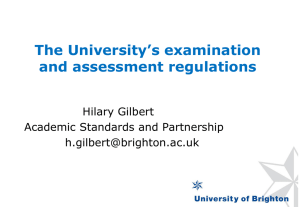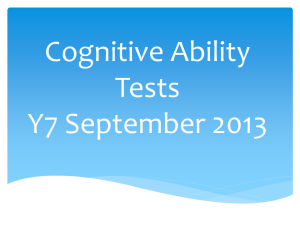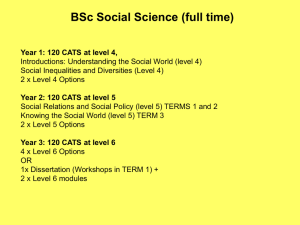PS BSc Hons Pharmacological Science Science 2011
advertisement
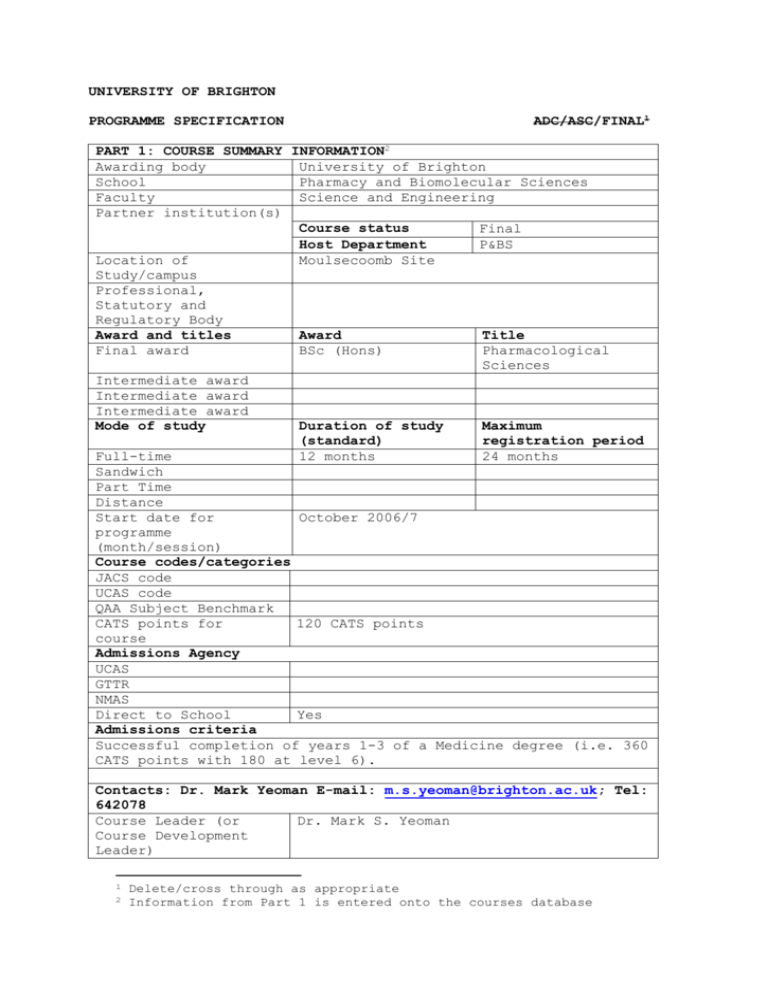
UNIVERSITY OF BRIGHTON PROGRAMME SPECIFICATION ADC/ASC/FINAL1 PART 1: COURSE SUMMARY INFORMATION2 Awarding body University of Brighton School Pharmacy and Biomolecular Sciences Faculty Science and Engineering Partner institution(s) Course status Final Host Department P&BS Location of Moulsecoomb Site Study/campus Professional, Statutory and Regulatory Body Award and titles Award Title Final award BSc (Hons) Pharmacological Sciences Intermediate award Intermediate award Intermediate award Mode of study Duration of study Maximum (standard) registration period Full-time 12 months 24 months Sandwich Part Time Distance Start date for October 2006/7 programme (month/session) Course codes/categories JACS code UCAS code QAA Subject Benchmark CATS points for 120 CATS points course Admissions Agency UCAS GTTR NMAS Direct to School Yes Admissions criteria Successful completion of years 1-3 of a Medicine degree (i.e. 360 CATS points with 180 at level 6). Contacts: Dr. Mark Yeoman E-mail: m.s.yeoman@brighton.ac.uk; Tel: 642078 Course Leader (or Dr. Mark S. Yeoman Course Development Leader) 1 2 Delete/cross through as appropriate Information from Part 1 is entered onto the courses database Admissions Tutor Dr. Mark S. Yeoman Examination and Assessment External Examiner(s) TBA (replacing James McLay) Examination Board(s) Pharmacology and Therapeutics AEB; (AEB/CEB) MPharm, OSPAP and Pharmacological Sciences CEB Approval/start dates Start date (month/session) October 2009 Approval date July 2006 May 2011 Validation Programme Specification Review date 2013 May 2012 PART 2: COURSE DETAILS AIMS AND LEARNING OUTCOMES Aims: The aims of the programme are ; To provide the knowledge and understanding to enable an appreciation of the rationale behind drug development programmes, therapeutic regimes and the consequences of drug therapy. To provide the skills to enable the successful design, implementation, analysis and presentation of a pharmacological research project. Learning Knowledge and theory: outcomes By the end of this course students will be able to: understand and explain the processes involved in drug discovery and development. Utilise their understanding of a complex body of knowledge to; discuss the mechanisms of action of drugs used in the prevention/treatment of common diseases. predict likely therapeutic uses of drugs targeted at specific biological targets predict likely adverse effects of drugs with known mechanisms of action. Skills By the end of this course students will be able to : use critical thinking, interpretative, problemsolving, practical and analytical skills to design and conduct laboratory and clinical experiments to investigate mechanisms of drug action and drug efficacy. use information technology effectively to gather, integrate and communicate information relevant to pharmacology and therapeutics. evaluate evidence to make reasoned predictions of drug actions and uses based on preliminary experimental data. ensure safe working in the laboratory. PROGRAMME STRUCTURE This is a one year intercalated degree with no intermediate awards. Students will enter the one year programme having gained 360 CATS from a BSMS programme or equivalent. An outline of the course is shown below detailing the distribution of the modules between the two semesters. PY425 PROJECT 40 CREDITS SPECIAL TOPICS PYM32 2 x 10 CREDITS from SPECIAL PYM01, TOPICSand PYM02, PYM03 20 CREDITS CHM03 PY344 DRUG DISCOVERY 10 CREDITS PY347 GENERAL PHARMACOLO GY 10CREDITS PY345 DRUG PROFILING 10 CREDITS PY346 PY344 RESEARCH DRUG METHODS DISCOVERY 10 10 CREDITS CREDITS SPECIAL TOPICS 2 x 10 CREDITS from PYM04-PYM09, 2 CHM04OPTION and BYM32 20 CREDITS SEMESTER 1 Research Methods (10 CATS points): This module provides the students with knowledge of pharmacological research methods, including experimental design, data analysis and coursework covering a variety of standard pharmacological research techniques. Specifically this module will develop critical thinking, interpretative, problem-solving and analytical skills through specific assignments. Drug Profiling (10 CATS points): This module provides the students with a chance to study, in depth, a contemporary pharmacological therapy. This module will build on students understanding of a complex body of information and enable the students to discuss the mechanisms of action of drugs used in the prevention/treatment of common diseases, predict likely therapeutic uses of drugs targeted at specific biological targets and predict likely adverse effects of drugs with known mechanisms of action. Project (40 CATS points); Students will begin their project in Semester 1 and complete it in Semester 2. The module will develop a range of practical, critical thinking, analytical, interpretative and problem solving skills. It will also enable the students to use information technology effectively to gather, integrate and communicate information relevant to the pharmacological sciences. Special Topics; students will choose 1 x 10 CATS point module from each of group A and B. Group A: Psychopharmacology (PYM02), Medicinal Plants and Their Uses (CHM03) Group B: Ion Channel Pharmacology (PYM03) or Current Topics in Infection (PYM01) Other options will be made available from the list below subject to timetabling restrictions: These modules will provide the students with knowledge that is at the current boundaries of academic knowledge and add to the complex body of information they have already assimilated. In addition these modules will help develop critical thinking and analytical skills. SEMESTER 2 Project (40 CATS points) continuation and completion of project General Pharmacology (10 CATS points); this module consists of a mixture of formal lectures and independent study designed to cover the pharmacology of the cardiovascular system and CNS. By the end of the module the students will be able to describe the mechanisms of action of key drug classes and also explain the mechanisms of adverse drug reactions and side effects. Special Topics; students will take 2 x 10 credit option choosing 1 x 10 credit options from EACH of the two groups detailed below: 1. New Medicinal Products (CHM04) or Specialised Clinical Practice (PYM04) or Diabetes Mellitus (PYM05) or Pharmaceutical Care of Surgical Patients (PYM09). 3. Oxidative Stress (PYM06) or Biomedical Implants and cell-based strategies (BYM32) or Pharmacogenomics (PYM07) or Pharmacological Aspects of Neuronal Ageing (PYM08). The two 10 CATS points Special Topics modules will provide information at the current boundaries of academic knowledge. These two modules will improve the students critical thinking and their analytical, interpretative and problem-solving skills. This course is not accredited by a PSB, however, the syllabus was designed around the indicative syllabus published by the British Pharmacological Society. Module codes Level 6 PY425 PY346 PY345 PY344 PY347 Level 7 PYM01 PYM02 PYM03 CHM03 PYM04 PYM05 PYM06 PYM07 PYM08 PYM09 BYM32 Status * Module Title Credit M C C C C Project Research Methodology Drug Profiling Drug Discovery General Pharmacology 40 10 10 10 10 O O O O O O O O O O O Current Topics in Infection Psychopharmacology Ion channel Pharmacology Medicinal Plants Specialised Clinical Practice Diabetes Mellitus Oxidative Stress and Disease Pharmacogenomics Pharmacology of Neuronal Ageing Pharmaceutical Care of Surgical Patients Biomedical Implants 2 x 10 *M = Mandatory C = Compulsory O = Optional 2 x 10 LEARNING, TEACHING AND ASSESSMENT Learning This 1 year course consists of approximately 400 and student contact hours and 530 hours of teaching guided/directed study. There is also 270 hours for the preparation and undertaking of assessments associated with the course. N.B. allocation of hours will vary depending on which options are taken. Lectures Practical Workshops PYM0103/05/07/08 /CHM03/04 26 Directed study Seminars Experiential Guided study Assessment preparation PYM04/09 PYM06 16 20 6 6 4 52 22 PY344 Lectures Workshops 52 22 52 22 PY347 PY425 40 6 208 PY345 32 Practical Assessment PY346 20 Directed study Seminars Experiential 24 Guided study Assessment preparation 38 22 38 78 8 8 22 98 88 22 104 44 Within the course, there are a variety of teaching methods employed including formal lectures, workshops where students learn through hands-on experience, directed study where a student is given a particular piece of work to complete independently, seminars where a group of students and a staff member discuss a topic, experiential learning, where a student is placed in a setting outside the University to gain an insight into various aspects of drug discovery and development, guided study where a student is directed towards module-specific texts to read and finally assessment where the student prepares for and undertakes various assessments to demonstrate the learning outcomes of each module have been met. Overall of the total 120 CATS points, 70 CATS points will be assessed by coursework (including the 40 credit project) and the remaining 50 CATS points by examination. Students will be accredited with 360 CATS (APEL) on entry, of which 180 CATS are at level 6. Lecture material, which will provide the knowledge and theory skills detailed earlier, will be assessed by an end of module written examination. Laboratory sessions will provide both practical and problem-solving skills and will be assessed by continuous assessment methods including full written laboratory reports and short MCQ assessments. In addition, the project will be assessed by means of a viva voce examination, which will test both oral skills, knowledge and problem-solving skills. An extended essay assessment for the Drug Profiling module will test both analytical and written communication skills. A project outline/grant application will form the assessment for the Research Methodology module. The drug discovery module will be assessed by means of a written report and a group-based presentation. At the end of semester 1 students will be expected to have handed in:: 1x 3000 word project proposal and given a presentation (PY346). 1 x 3000 word extended essay detailing the pharmacology and therapeutics of a contemporary therapy (PY345). In addition students will sit 2 x 2hr examinations in their Special Topics options. At the end of Semester 2 students will be expected to have handed in: 1 x project report, given a 10 minute presentation on their project and attended a 20 minute viva voce examination (PY425). 1 x 1hr written examination (PY347) 1 x 3000 word extended essay on drug discovery and contributed to a group presentation on the drug discovery process (PY344). In addition students will sit 2 x 2hr examinations in their Special Topics options. REGULATIONS Regulations The course regulations are in accordance with the University's General Examination and Assessment Regulations (available from the school office or the Registry). In addition, the following course-specific regulations apply: Candidates must have studied all compulsory modules and must have achieved 120 credits to be awarded a BSc in Pharmacological Sciences. In order to receive a degree with honours students must have passed the mandatory 40 credit project module. The pass mark for all modules, unless otherwise stated is 40%. Students must study at least 2 x 10 credit modules from PYM01-09 to be awarded a BSc (Hons) Pharmacological Sciences Students can study up to 40 Level 7 credits for the award of a BSc (Hons) Pharmacological Sciences. PROFESSIONAL AND STATUORY BODY DETAILS (optional) There is no PSB for the practice of pharmacology, nor a QAA benchmark statement. The programme, however, has drawn on the indicative syllabus as laid down by the British Pharmacological Society. LEARNING SUPPORT Central support: all students benefit from: University induction week Student Handbook Course Handbook Extensive library facilities Computer pool rooms E-mail address Welfare service Personal tutor for advice and guidance ADDITIONAL INFORMATION More detailed information about the course can be found in a range of documents, including Student Handbook Student Intranet University Student Handbook General Examination and Assessment Regulations for Taught Courses QUALITY INDICATORS This section details external indicators of the quality of the provision QAA Subject Review outcome and date National student awards Professional accreditation: [full details of professional accreditation can be found under course structure] 23 out of 24 (1999) None None RESEARCH INFORMED TEACHING The BSc Pharmacological Sciences course will encourage the relationship between research and teaching which is considered to be of “increasing significance for the future academic shape and culture of the university” as highlighted in the Research-Informed Teaching document which was presented at a recent Academic Standards Committee meeting. Specifically, this course will address the 4 main approaches are requirements for the strategic implementation of researchinformed teaching: (1) Ensuring a research-based curriculum by inclusion of modules covering research methodology and making the research project a major aspect of the course, (2) Utilising current staff research in the curriculum by providing teaching from research-active members of academic staff, especially in the “Special Topic” modules the content of which is often based around the research interests of academic staff, (3) Using pedagogic research to inform teaching methods by making use of the extensive body of University of Brighton and externally available higher educational research publications and other information, (4) Developing students as researchers by offering several modules covering research methodology followed by an extensive research project. Small group tutorials in the form of PBL sessions will also be used to disseminate research. To summarise, this course will be taught by research active members of staff, and the research project will be associated with one of our research strengths, and supervised by research active members of the research groups, with help from our postdoctoral fellows. Furthermore, a number of the options modules, such as Ion Channel Pharmacology, Oxidative stress, Biomaterials and Medical Genetics are specifically built around the expert research groups within the School. In time, it is envisaged that the list of Master’s options will be expanded to include other research areas such as the cellular basis of ageing and wound healing. SUSTAINABLE DEVELOPMENT The University’s Sustainable Development Policy has been taken into account during the course development, both in terms of the curriculum and in the way the course will be delivered. The guiding principle as described in the UK Government Sustainable Development Strategy (2005) of using sound science responsibly, is clearly very relevant to this particular degree, and elements of most modules will subscribe to this principle. As examples, module PY346 (Research Methodology) asks the student to consider what science is, and how it is distinguished from other academic disciplines, and then attempts to challenge conventional views of the definitions of science. It asks the student to consider the ethical issues associated with their science, in particular their own project area, and also expects them to understand and comply with the Human Tissues Act and the Research Code of Conduct. It also expects students to understand the importance of good experimental design and analysis, and the reporting (and reading) of research in an unbiased and nonprejudiced way. An interpretation of the University’s view of sustainable development as applied to the whole course may be summarised as ‘fitness for purpose’. That is, will the course provide the student with an education which will meet the needs, both personal and vocational, of that student into the future? This BSc addresses this need in a number of ways. Primarily, it teaches underlying principles of pharmacology, so that these may be applied to the changing landscape of medicines that are available for doctors to prescribe in the future. Specific examples can be found in modules, for example, where very recent diagnostic, or potentially diagnostic, techniques are presented to the student along with their fundamental principles so that these can be understood and used appropriately when the students qualify as doctors. A second aspect of ‘fitness for purpose’ is the idea that the students have core modules to study, but are able to choose from a series of options so as to tailor their own degree to their own particular future needs (or, indeed, interests). In terms of vocation, the graduates studying this degree are intercalating medical students who will go onto to become the next generation of doctors. As stated above, the degree is designed to equip the student with the higher level skills and knowledge in pharmacology to enable them to become better prescribers when they qualify.




